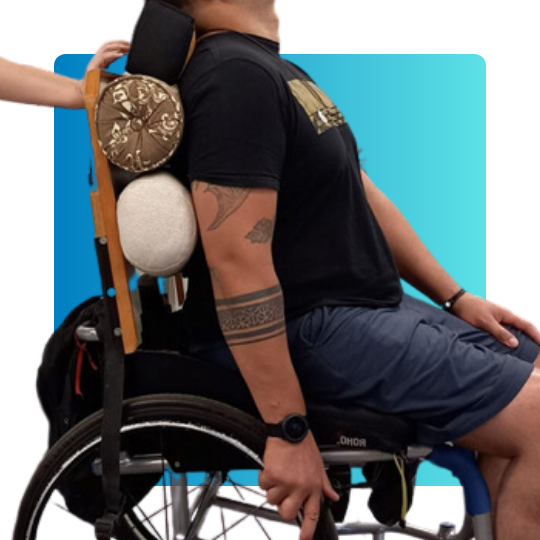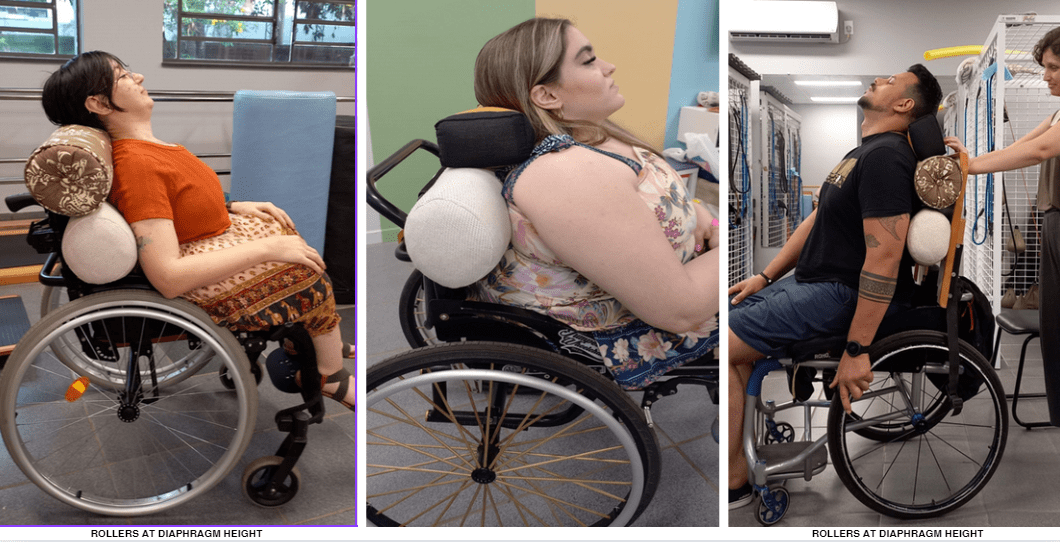Acquiring body literacy and understanding the subjectivity of people with disabilities in Bioenergetic Analysis | Adquirindo letramento corporal e compreendendo a subjetividade de pessoas com deficiência na análise bioenergética | Приобретение телесной грамотности и понимание субъективности людей с ограниченными возможностями в биоэнергетическом анализе
 |
Other translations in ... |  |
 |
 In our society, disability bodies are invisibilized in all social spheres. In order to exist as active, productive and desiring individuals, they make a great effort on a daily basis. Their lives are permeated by architectural obstacles, both in getting around the city and in their homes, clinics, schools and companies, and by relational and affective impediments.
In our society, disability bodies are invisibilized in all social spheres. In order to exist as active, productive and desiring individuals, they make a great effort on a daily basis. Their lives are permeated by architectural obstacles, both in getting around the city and in their homes, clinics, schools and companies, and by relational and affective impediments.
Society excludes people with disabilities (PWD) from birth, when it refers to a congenital disability, until death. Inclusion in schools, at work and in social relationships is flawed and inefficient, because even though there are quota laws and training for the inclusion of people with disabilities, this doesn't happen, because our social model doesn't embrace all diversity.
Anthropologist Débora Diniz, in her book "O que é Deficiência" (What is Disability), reflects on the fact that disability is discussed in biomedical terms, where it is understood that the disabled body is a body that has a lack of functionality, so in a society based on capitalism as an economic system, there is no interest in bodies that don't produce as expected by the system. Disabled people don't matter and the whole culture is shaped by their non-inclusion.
Thus, if we understand disability outside the biomedical context, but rather in the socio-economic political context, it is clear that the issue is not a disabled body, but a social organization that excludes it.
This view completely changes the perception we have of the potential and life possibilities of the disabled. We are all contaminated by the idea of biomedicine, which determines their place in society's imagination, their behavior and the relationship we establish with the PCD, and this is where ableism comes in.
Capacitism is any prejudice and discrimination against people with disabilities. Every effort that people with disabilities make to exist and participate in society is an anti-capacitist struggle, their daily struggle to gain access to schools, health and work. Di Marco, Victor reports as a PWD: "[Capacitism] teaches us that we are not worthy of desire, of affection. I couldn't see myself as a possibility, and for a long time I couldn't see myself as a possibility for others. That's where the perversity of exclusion lies: managing to make the 'minority' feel unworthy of a right or a will."
What Di Marco says about his own experience as a disabled person is what we found as a result of our work. From the interviews and group work, it became clear that every effort to have his existence and belonging recognized involves feelings of low self-esteem, insecurity, anxiety and sadness.
As bioenergetic therapists, we need to be aware of the psychic pain of the disabled. We can't listen to them and disregard their experience as invisibilized bodies, segregated in search of belonging, and the pain that accompanies them.
It's not possible to propose bodywork to people with disabilities without the therapist first recognizing all the potential for flow and pulsation that exists in this body. To do this, we need to move away from the biomedical model by reading the body in front of them, helping them to find ample breathing, grounding and a connection with their "being".
Any device that the PWD may need, such as a wheelchair, crutch or walker, should be included, as for many they are an extension of their bodies in the search for grounding.

(This study was partially funded by our IIBA Research Grant 2023.)
 Em nossa sociedade os corpos com deficiência são invisibilizados em todas as esferas sociais, para que existam como sujeito atuante, produtivo e desejante fazem um grande esforço diariamente. Suas vidas são permeadas por obstáculos arquitetônicos, tanto no deslocamento na cidade quanto nas casas, clínicas, escolas e empresas, e por impeditivos relacionais e afetivos. A sociedade exclui Pessoas Com Deficiência (PCD) desde seu nascimento, quando refere-se a uma deficiência congênita, até sua morte. A inclusão nas escolas, no trabalho e relações sociais são falhas e pouco eficientes, pois mesmo havendo leis de cotas e treinamento para a inclusão de PCD isto não acontece, nosso modelo social não abarca toda a diversidade.
Em nossa sociedade os corpos com deficiência são invisibilizados em todas as esferas sociais, para que existam como sujeito atuante, produtivo e desejante fazem um grande esforço diariamente. Suas vidas são permeadas por obstáculos arquitetônicos, tanto no deslocamento na cidade quanto nas casas, clínicas, escolas e empresas, e por impeditivos relacionais e afetivos. A sociedade exclui Pessoas Com Deficiência (PCD) desde seu nascimento, quando refere-se a uma deficiência congênita, até sua morte. A inclusão nas escolas, no trabalho e relações sociais são falhas e pouco eficientes, pois mesmo havendo leis de cotas e treinamento para a inclusão de PCD isto não acontece, nosso modelo social não abarca toda a diversidade.
A antropóloga Débora Diniz, em seu livro “O que é Deficiência”, traz a reflexão acerca da deficiência ser discutida nos termos biomédicos, onde entende-se que o corpo com deficiência é um corpo que apresenta uma falta de funcionalidade, desta maneira em uma sociedade pautada no capitalismo como sistema econômico, não há interesse em corpos que não produzam como o esperado pelo sistema. PCDs não interessam e toda a cultura é formada por não inclusão dos mesmos.
Desta maneira se entendermos a deficiência fora do contexto biomédico, e sim no contexto político socioeconômico é evidente que a questão não é um corpo com deficiência, e sim uma organização social que o exclui.
Este olhar muda completamente a percepção que temos enquanto potencialidade e possibilidades de vida da PCD, estamos todos contaminados pela ideia da biomedicina, o que determina o lugar no imaginário da sociedade, seu comportamento e relação que estabelecemos com a PCD, e aqui nasce o capacitismo.
Capacitismo é todo e qualquer preconceito e descriminação contra uma PCD, todo o esforço que a PCD faz para existir e participar da sociedade é uma luta anticapacitista, sua luta é diária para ter acesso às escolas, saúde e trabalho.
Di Marco, Victor relata enquanto PCD: “O capacitismo nos ensina que não somos merecedores de desejo, de afeto. Eu não conseguia me enxergar enquanto possibilidade própria, e não consegui, durante muito tempo, me colocar enquanto possibilidade para o outro. A perversidade da exclusão se dá aí: conseguir fazer com que a “minoria” não se ache digno de um direito ou de uma vontade.”
O que Di Marco diz sobre sua própria experiência enquanto PCD foi o que encontramos como resultados de nosso trabalho, a partir das entrevistas e trabalho em grupo ficou evidente que todo esforço para ter sua existência e pertencimento reconhecida perpassa sentimentos de baixo auto estima, insegurança, ansiedade e tristeza.
Enquanto terapeutas bioenergéticos faz-se necessário o conhecimento da dor psíquica da PCD, não podemos ouvi-los e desconsiderar sua experiência enquanto corpos invisibilizados, segregados em busca do pertencimento, e a dor que os acompanha.
Não é possível propor trabalhos corporais a PCD sem antes o terapeuta reconhecer toda potencialidade de fluxo e pulsação que existe neste corpo, e para isto devemos nos deslocar do modelo biomédico fazendo uma leitura do corpo que está a sua frente, ajudando-o a encontrar uma respiração ampla, seu grounding e uma conexão com seu “ser”.
Todo dispositivo que a PCD possa necessitar, como cadeira de rodas, muleta, andador, deve ser incluído, pois para muitos estes são extensão de seus corpos para a busca do grounding.

(Este projeto foi parcialmente financiado pela nossa bolsa de pesquisa IIBA 2023.)
 В нашем обществе тела людей с инвалидностью невидимы во всех социальных сферах. Для того чтобы существовать как активные, продуктивные и полные стремлений личности, они ежедневно прилагают огромные усилия. Их жизнь пронизана архитектурными препятствиями, как в передвижении по городу, так и в их домах, клиниках, школах и организациях, а также препятствиями в отношениях и аффективной сфере.
В нашем обществе тела людей с инвалидностью невидимы во всех социальных сферах. Для того чтобы существовать как активные, продуктивные и полные стремлений личности, они ежедневно прилагают огромные усилия. Их жизнь пронизана архитектурными препятствиями, как в передвижении по городу, так и в их домах, клиниках, школах и организациях, а также препятствиями в отношениях и аффективной сфере.
Общество исключает людей с ограниченными возможностями (ЛОВ) с момента рождения, когда речь идет о врожденной инвалидности, и до самой смерти. Инклюзия в школах, на работе и в социальных отношениях несовершенна и неэффективна, поскольку, несмотря на законы о выделении квот и тренинги по включению людей с инвалидностью, этого не происходит, потому что наша социальная модель не охватывает все возможное многообразие.
Антрополог Дебора Диниз в своей книге "O que é Deficiência" ("Что такое инвалидность") размышляет о том, что инвалидность обсуждается в биомедицинских терминах, где понимается, что тело инвалида - это тело с недостаточной функциональностью, поэтому в обществе, основанном на капитализме как экономической системе, нет интереса к телам, которые не производят то, что ожидает система. Инвалиды не имеют значения, и вся культура формируется благодаря их не включенности.
Таким образом, если мы понимаем инвалидность вне биомедицинского контекста, а скорее в социально-экономическом политическом контексте, становится ясно, что дело не в теле инвалида, а в социальной организации, которая его исключает.
Такой взгляд полностью меняет наше представление о потенциале и жизненных возможностях инвалидов. Мы все заражены идеей биомедицины, которая определяет их место в сознании общества, их поведение и отношения, которые мы устанавливаем с ЛОВ.
Капацитизм - это любые предрассудки и дискриминация в отношении людей с ограниченными возможностями. Все усилия, которые предпринимают люди с ограниченными возможностями, чтобы существовать и участвовать в жизни общества, - это антикапацитистская борьба, их ежедневная борьба за доступ к школам, здравоохранению и работе. Виктор Ди Марко рассказывает о себе, как о человеке с ограниченными возможностями:
"[Капацитизм] учит нас, что мы недостойны желания, привязанности. Я не мог видеть себя как достойного, и долгое время я не мог видеть себя как достойного для других". Вот где кроется извращенность отчуждения: заставить "меньшинство" чувствовать себя недостойным права или желания".
То, что Ди Марко говорит о своем опыте инвалида, совпадает с тем, что мы обнаружили в результате нашей работы. Из интервью и групповой работы стало ясно, что каждая попытка признать свое существование и принадлежность к обществу сопряжена с чувством низкой самооценки, неуверенности, тревоги и печали.
Как биоэнергетические терапевты, мы должны осознавать психическую боль инвалидов. Мы не можем слушать их и игнорировать их опыт как невидимых тел, изолированных в поисках принадлежности и сопутствующую этому боль.
Невозможно предлагать телесную работу людям с ограниченными возможностями без того, чтобы терапевт сначала не признал весь потенциал потока и пульсации, который существует в этом теле. Для этого нам необходимо отойти от биомедицинской модели, читая тело перед собой, помогая ему найти свободное дыхание, заземление и связь со своим "Я".
Любые приспособления, которые могут понадобиться человеку с ограниченными возможностями, должны быть задействованы - инвалидное кресло, костыли или ходунки, поскольку для многих они являются продолжением их тела в поисках заземления.

(Это исследование было частично профинансировано IIBA Research Grant 2023).
Glaucia Furlan | Trainee from Instituto de Análise Bioenergética de São Paulo & Kátia da Mota Assis | CBT from Instituto de Análise Bioenergética de São Paulo











